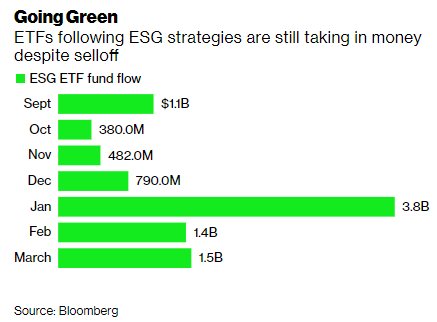This website uses cookies so that we can provide you with the best user experience possible. Cookie information is stored in your browser and performs functions such as recognising you when you return to our website and helping our team to understand which sections of the website you find most interesting and useful.
April 7, 2020
When the Going Gets Tough, The Good Get Going
The “flight to quality” in bear markets is well established. The COVID-19 crisis, however, is both a dramatic crisis with immediate, substantial impacts on employment levels worldwide and is also the first crisis after the ascendancy of the environmental, social, and governance (ESG) conscious investing in 2019 began to change what constitutes “quality” in a company (Morningstar reports that $21B of new money flowed into ESG funds in 2019, four times the annual record set in 2018). Consequently, it is natural to ask, does high performance in ESG management – which is rightly all about creating long-term value through managing ESG-related risks and opportunities – correlate with high outperformance in this crisis?
The early evidence suggests there is a substantial positive correlation between recognized ESG high performance and outperforming peer enterprises. Research has not yet demonstrated a causal relationship between recognized ESG leadership and outperformance in this crisis, but early data do point to the fact that ESG-conscious funds are doing very well in a relative sense. This is still true even when gas and oil stocks – which have been hard hit for their own reasons – are removed from the comparisons.
The success of ESG funds during this pandemic will not surprise the scores of leading companies it has been SR Inc’s privilege to assist over more than a decade. The COVID-19 pandemic has only provided more evidence of SR Inc’s animating thesis: companies focused on building long-term value through managing the ESG considerations important to their customers, employees, investors and host communities will win a competitive advantage with those stakeholders. As we wrote back in January (Operating to High ESG Performance), in late 2018 (ESG Performance Now Mainstream Driver for Shareholder Value), and as far back as 2015 (Corporate Sustainability as a More Strategic Approach to Management Gets a Shot in the Arm), strong ESG performance is reflected in improved shareholder returns. This was true during the unprecedented bull market of the 2010s, and it is proving especially true during this period of great volatility and uncertainty. Four articles and reports over the last 30 days make this point starkly clear:

The Global Head of ESG at State Street, Mark McDivitt, writes in the article “COVID-19 & Its Impact on ESG,” “Incorporating ESG factors into investment decision-making models is anticipated to continue on its exponential growth trajectory…It is now truer than ever that the challenges we face as a society and with our environment are increasingly interconnected and will increasingly drive 21st century risk management and 21st century corporate culture. ESG factors will increasingly play a critical role.” The article also cites the CEO of DeVere who found that the average fund incorporating ESG factors recorded only half the drop of the S&P 500 Index through March 30th and predicts a material jump in ESG investing over the next 12 months due to the pandemic.
The Chief Marketing Strategist at Chaikin Analytics, Dan Russo, was quoted in the Bloomberg article, “ESG Stock Resilience is Paving the Way for a Surge in Popularity” as saying, “The advantage of ESG companies right now is a perception that they are more likely to take a stakeholder view of their business as opposed to a purely shareholder view of their business. Investors are starting to look to the other side of this initial coronavirus situation and maybe looking for the companies that did right by their employees, that did right by their supply chain.” According to the article, 59% of U.S. ESG exchange-traded funds (ETFs) outperformed the S&P 500 Index in January through the end of March and are still growing in popularity despite huge market selloffs (see graphic below).
Michelle Edkins, a managing director at BlackRock, the world’s largest private investment firm, was quoted in the TriplePundit article, “Blackrock Investors Push for Climate Action During Pandemic” as saying, “The concept of long-term sustainability would suggest that companies that come through this crisis and do well would be exactly the kinds of companies you would look to as role models.” The article notes that BlackRock is not giving companies a pass when it comes to ESG during the pandemic and argues that companies with strong ESG programs could actually become more resilient (for more on Blackrock CEO Larry Fink’s annual letter to the companies it invests in, see our January post “NetZero2020: A Clear Vision of Shared Responsibility”). COVID-19 highlights that caring for workers (the “S” in ESG) is just as important as caring for the environment (the “E” in ESG) when evaluating long-term company health.
These market leaders and the evidence they cite are supported by recent RBC Capital Markets and Bank of America (BofA) Global Research reports that found companies with better ESG risk profiles beat those with lower ones since the S&P 500 peaked on February 19th. As described in the Barron’s article, “Sustainable Companies are Beating the Market During the Crisis. Will It Last?,” the BofA report states that since the Feb. 19 peak, stocks with ESG scores in the top quintile outperformed those that ranked poorly by 5-10% in the U.S. and Europe and that stocks with lower ESG scores were seeing bigger cuts to earnings forecasts. The article ends with a quote from Sustainable Market Strategies: “the underpinnings of sustainable investing remain alive and well—despite the collapse in oil prices and the fact that many governments’ green growth agendas could be pushed back in time. In fact, current market pricing of several ESG-relevant investment themes suggests that investors are still confident that the future will be a more sustainable one.”
All these data support what many intuitively suspect: in especially uncertain times, those who have demonstrated a commitment to creating long-term value by investing in their relationships with customers, employees, investors, suppliers, and host communities only become more valuable. SR Inc Member-Clients suspect that if this global pandemic worsens over the next year, their engagement with stakeholders to understand their concerns (including the extreme weather, global pandemics, and forced migration risks human caused climate breakdown increases) and hopes will become only more important. Stakeholder engagement could also become even more important to brand definition in a way that rarely happens in a more brashly materialistic bull market because when the going gets tough, bad relationships tend to break and good relationship tend to deepen.
 Jim Boyle is CEO & Founder of Sustainability Roundtable, Inc. For more than ten years, Jim has led full-time teams of diverse experts to assist nearly 100 Fortune 1000 companies on a multi-year basis in their move to more sustainable high-performance. Specifically, SR Inc has helped world-leading corporations, real estate owners and federal agencies to Set Goals, Drive Progress & Report Results in greater Corporate Sustainability. Mr. Boyle led in the creation of SR Inc’s Renewable Energy Procurement Services (REPS), which advises and represent Fortune 1000 Member-clients and fast growth technology companies across the U.S. and internationally in the development of Renewable Energy Strategies and the procurement of both on and off-site advanced energy solutions. Before founding SR Inc, Mr. Boyle co-led Trammell Crow Company Corporate Advisory Services in San Francisco and returned to his native Boston and Trammell Crow Company’s market leading team in Greater Boston where he received the Commercial Brokers Association’s Platinum Award for the highest level of commercial real estate transactions. Earlier, he advised companies on real estate and environmental matters as as attorney at a large law firm based in Boston. Jim is a graduate of Middlebury College where he co-captained the football team and Boston College Law School, who early in his career served as a federal law clerk, an aide to John F. Kerry in the U. S. Senate and on Vice President Al Gore’s campaign for President.
Jim Boyle is CEO & Founder of Sustainability Roundtable, Inc. For more than ten years, Jim has led full-time teams of diverse experts to assist nearly 100 Fortune 1000 companies on a multi-year basis in their move to more sustainable high-performance. Specifically, SR Inc has helped world-leading corporations, real estate owners and federal agencies to Set Goals, Drive Progress & Report Results in greater Corporate Sustainability. Mr. Boyle led in the creation of SR Inc’s Renewable Energy Procurement Services (REPS), which advises and represent Fortune 1000 Member-clients and fast growth technology companies across the U.S. and internationally in the development of Renewable Energy Strategies and the procurement of both on and off-site advanced energy solutions. Before founding SR Inc, Mr. Boyle co-led Trammell Crow Company Corporate Advisory Services in San Francisco and returned to his native Boston and Trammell Crow Company’s market leading team in Greater Boston where he received the Commercial Brokers Association’s Platinum Award for the highest level of commercial real estate transactions. Earlier, he advised companies on real estate and environmental matters as as attorney at a large law firm based in Boston. Jim is a graduate of Middlebury College where he co-captained the football team and Boston College Law School, who early in his career served as a federal law clerk, an aide to John F. Kerry in the U. S. Senate and on Vice President Al Gore’s campaign for President.
 As Manager of Research & Consulting at Sustainability Roundtable, Inc., Jeff Meltzer provides outsourced program assistance to clients on a one-to-one basis, helping real estate, operations, and sustainability executives set goals, drive progress, and report the results of their sustainability programs. Jeff holds a Master of Environmental Management from Duke University’s Nicholas School of the Environment and a B.A. in Environmental Policy from Colby College. He has relevant work experience with the Procurement and Property Services team at Citizens Bank as an EDF Climate Corps Fellow, with the EHS and Sustainability team at L’Oréal, and with the EPA Green Power Partnership as an Environmental Analyst at Eastern Research Group. He has client project experience with Biogen, helping the company develop a Scope 3 supplier engagement strategy to achieve its Science-Based Target. Jeff is also an active participant in sustainability groups, is an accredited LEED Green Associate, is trained in the GRI Standards and GHG Protocol, was the Co-President of the Duke’s Net Impact club, and is an active member of the professional Net Impact Boston leadership team.
As Manager of Research & Consulting at Sustainability Roundtable, Inc., Jeff Meltzer provides outsourced program assistance to clients on a one-to-one basis, helping real estate, operations, and sustainability executives set goals, drive progress, and report the results of their sustainability programs. Jeff holds a Master of Environmental Management from Duke University’s Nicholas School of the Environment and a B.A. in Environmental Policy from Colby College. He has relevant work experience with the Procurement and Property Services team at Citizens Bank as an EDF Climate Corps Fellow, with the EHS and Sustainability team at L’Oréal, and with the EPA Green Power Partnership as an Environmental Analyst at Eastern Research Group. He has client project experience with Biogen, helping the company develop a Scope 3 supplier engagement strategy to achieve its Science-Based Target. Jeff is also an active participant in sustainability groups, is an accredited LEED Green Associate, is trained in the GRI Standards and GHG Protocol, was the Co-President of the Duke’s Net Impact club, and is an active member of the professional Net Impact Boston leadership team.


